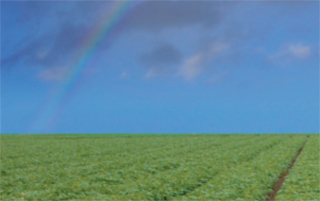In 2011, New Jersey ranked second in the nation for net farm income per acre and third for production value per acre according to the USDA’s Economic Research Service. What these rankings confirm is despite its limited growing area in a diminutive, well-urbanized state, growers efficiently crank out high value, high quality crops.
Diversity
The ethnicities in the region are as varied as the produce, including a large Indian population, followed by Portuguese and Asian, reports Murray. The melting pot has created a healthy demand for many specialty crops. Ryan Flaim, managing member of grower-shipper and repacker R&R Flaim Next Generation Produce, LLC in Vineland says, “Ethnic diversity has played a big part in the last ten years. We offer a lot of specialty peppers, Asian and Indian vegetables, fruits, and herbs.” Some examples Flaim calls out are poblanos, habaneras, bok choi, napa cabbage, and methi leaf. He notes, “Kale and baby bok choi are trendy right now.”
New Jersey is also the site for a new sweet pepper variety, the Peppadew, originally discovered and grown in Tzaneen, South Africa. Two U.S. companies, Los Angeles-based Melissa’s/World Variety Produce and fresh-cut processor Supreme Cuts, LLC in Mahwah, NJ signed exclusive deals with Peppadew Fresh LLC to market ‘Peppadew Gold,’ a sweet yet tangy mild pepper. “Although we just got involved at the tail-end of 2012’s season, we’re excited about what the future may bring,” commented Supreme Cuts president, Merle Axelrod.
Local, Local
Whether it is a specialty or a staple, freshness is essential. “Jersey Fresh,” the state’s agricultural promotion program, is regarded as a huge success, and recently unveiled a new website, chock full of information such as weather patterns, zone maps, soil testing labs, and details on how interested growers can join the program.
Now approaching its thirtieth year, this first-of-its-kind program was established long before locally-grown was en vogue. Bill Nardelli, Sr., president of grower and shipper Nardelli Brothers, Inc. in Cedarville, explains, “The local movement has had a huge impact and really enhanced our sales. The demand for locally grown has increased ten-fold over the last few years.”
The advantages of South Jersey’s growing region are numerous, starting with its soil. Nardelli describes the substrate as “a sandy loam with just a little heaviness and good drainage. It’s conducive for row crops.” The sandy soils are surrounded by four major metropolises: New York City, Boston, Philadelphia, and Washington DC and this proximity to tens of millions of people puts the produce industry in an enviable marketing position.
Another advantage is the Vineland Produce Auction in Vineland, a pillar of New Jersey’s farming tradition. Growers formed the cooperative in 1930 and it remains a highly competitive clearinghouse of freshly-picked produce. “It’s an institution,” says Murray. “It’s the largest and last of its kind east of the Mississippi.”
There is also ease-of-access to multiple terminal markets and ports of entry—including unparalleled reach to six terminal markets from Boston to New York City to Philadelphia—and the choice of nearby ports, including Wilmington and Tioga. “Logistically, we’re in a good spot,” says Wetherbee. “We can get blueberries off the bush, cooled, packed, and out to major areas overnight.”



